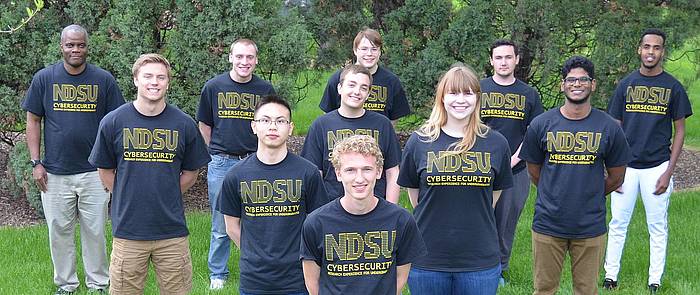
When students consider where to get experience to launch a career researching the frontiers of cybersecurity, North Dakota should come to mind.
For the second summer in a row, students from across the country have come to NDSU to participate in a 10-week intensive Research Experience for Undergraduates program where they learn how to research and develop software for attacking, defending and detecting attacks against cyber-physical systems like robots and industrial controllers for water and power.
Among the students is 19-year-old Jack Hance, who was one of two NDSU students selected to participate in the program along with students from Alabama, California, Minnesota and several other states. He is a sophomore studying computer science.
“Cybersecurity is an area of key national need. This is particularly true for cyber-physical systems, where a successful attack can injure – or even kill – people in the real world,” said NDSU assistant professor Jeremy Straub, who is also the associate director of the NDSU Institute for Cyber Security Education and Research. “By getting undergraduate students involved in cybersecurity research, we are preparing them to build the next generation of security technologies. These technologies will be critical to securing public and private devices and networks. Several of the technologies currently under development by students may even have applications to national defense.”
By participating in the National Science Foundation-sponsored program, students have the opportunity to explore cybersecurity from multiple perspectives. They also learn research and software development best practices. For security technologies, poorly written or faulty code can prevent software from performing its defensive function or even provide an entry point for an attacker.
This helps the students to understand the importance of development accuracy and testing, driving home the lessons that students have learned in their coursework. Most importantly, the students get an opportunity to try their hand at performing real-world research. They choose a topic with their mentor and set off to explore the unknown.
Hance’s project focused on detecting attacks on computer systems that may be manually coordinated between multiple hackers or launched on multiple systems by a single hacker at the same time. Because there is no electronic connection between these activities, current detection systems are not designed to identify them as a single attack. Hance developed and tested algorithms that could be used to identify when one individual or a group acting in concert was launching attacks from multiple computers. He analyzed the commands entered by users to identify patterns that were common between systems.
“It can be used in computer forensics investigations to help put a stop to cyber-attacks and cyber-crimes,” Hance said. He noted the work would allow network security staff and law enforcement to begin “profiling individuals using secondary information – using anomaly detection and machine learning techniques – to identify and compare individuals using information that most don’t consider related.”
In addition to their research work in Fargo, students traveled to the National Cyber Summit in Huntsville, Alabama, where they learned about others’ cybersecurity research and participate in a cybersecurity “capture the flag” competition. The students also visited the Oscar Zero decommissioned missile site, where they learned about the importance of mission critical systems’ security.
“I find computer science and technology in general very interesting and this seemed like a great way to learn more about what I love while meeting people and gaining lifetime experiences,” Hance said, noting he had gained “knowledge of machine learning on abstract data and natural language techniques.”
The students were selected for admission to the program based on their current skillset and the value that they show the program will have for them. The goal is to show the options that a degree in computer science and related fields provide and to allow students to determine whether they may want to pursue graduate studies and a career in computing research.
As a student-focused, land grant, research university, we serve our citizens.





